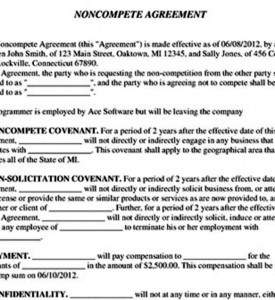
Ignoring a non-compete clause can be very tempting, especially if you left your employer feeling that you weren’t given proper notice or that you were owed wages or commissions. Don’t let this type of situation cloud your better judgement because ignoring an enforceable non-compete clause can be very costly. Even bankruptcy won’t discharge you of this debt.
Recently there was an action that demonstrates clearly why not to ignore a non-compete clause. An employer terminated its agreement with one of its associates. Although a non-compete clause was in place, the associate chose to ignore it and continued doing business with several of his former boss’s customers or former customers. The employer brought action against his former associate to recover losses allegedly sustained as a result of the former associate ignoring the non-compete clause in his contract and therefore breaching his agreement with his former employer.
The claim under the judgement the employer obtained against the former associate for loss of profits was not discharged by the former associate’s bankruptcy, given that it was ruled to be a debt incurred for breach of fiduciary duty, which is a type of debt not discharged under section 178(1) of the Bankruptcy and Insolvency Act (Canada).
Don’t let your emotions cloud your better judgement. Even if you think your former employer owes you wages, ignoring an enforceable non-compete clause is not the answer. As you can see by this action, whether you leave an employer voluntarily or otherwise, if there is an enforceable non-compete clause in place, and you take customers away from your former employer during the non-compete period, not only can they obtain a judgement for the lost profits, bankruptcy also won’t discharge you of that debt.
For more information on this or any issue related to insolvency or bankruptcy contact Ira Smith Trustee & Receiver Inc. We’re an insolvency and financial restructuring practice for individuals and companies in the Greater Toronto Area (GTA) facing financial crisis. Our speciality is serving individuals and the private company entrepreneurial market, regardless of size. If you’re experiencing financial difficulties, we can help you recover financially Starting Over, Starting Now.









